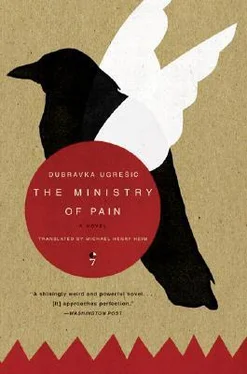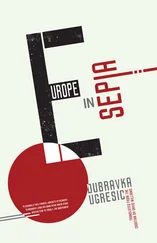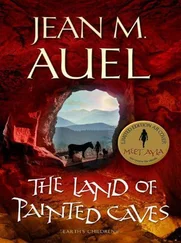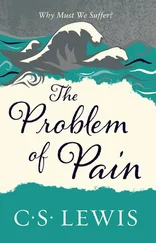I walked slowlydown the five flights of stairs and who should I run into on the ground floor but Laki, Laki the Linguist from Zagreb, who had attended a few classes during the first semester only to disappear. He paused for a moment, as if in doubt as to how to proceed, then screwed up his eyes, looked away from me, and said in a lazy drawl, “So how are we doing, Mrs. Luci  ?”
?”
“I’m fine, thank you. And you?”
“Fair to middling. Still hanging around the Department, as you can see.”
“Right. Otherwise we wouldn’t have run into each other.”
“And starting September I’m going to be here every day.”
“Really?”
“They’re giving me an office. So I can finish up my dictionary.”
“Good for you.”
“Not bad, and things will be even better once the dictionary comes out.”
“I’m sure they will.”
“We could never have dreamed of this when the Commies were in power.”
“That’s for sure,” I said, the irony in my voice clearly going over Laki’s head.
“I’ve got some funding from the Ministry of Tourism in Croatia. It’s in their interest, after all. It’ll help the Dutch tourist trade. I’ve managed to squeeze something out of the Ministry of Culture, too. And the Department here is doing its bit with the office. No great shakes, of course, but they may also let me teach a few drill sections.”
“Sounds great.”
“Not bad…. By the way, you going home for the summer?” He used the word “home” as a neutral substitute for the country that, while it was still in existence, the Gastarbeiter had all called Yuga and pronounced with extra-long vowels.
“I may.”
“Well, I can’t wait. My parents have this great house on Hvar. I spend two months there every year.”
“Yes, well…. See you.”
“Best of luck, Mrs. Luci  ,” he said.
,” he said.
The screwed-up eyes that refused to hold your glance for more than an instant, the anti-Communist stance so fashionable after the changing of the guard (though Laki had had nothing to do with Communism one way or the other), the mishmash of “now” urban speech, dialect, and literary affection (it was as if grandfather and grandson were speaking out of the same mouth), the ever so forced “Mrs. Luci  ”—it was all vaguely nauseating, like a premonition of something unpleasant.
”—it was all vaguely nauseating, like a premonition of something unpleasant.
Instead of going out, I went back upstairs and knocked on Cees’s door. He was alone.
“Come in, Tanja. Good to see you. I’ve been meaning to track you down.”
Neither he nor Ines had made any attempt to “track me down” since I’d been to their place that evening. In fact, I had phoned them once or twice and been treated to Ines’s warm words about how busy they were and had no time for anything and I’d been constantly on their minds and they’d been hearing such good things about me from my students and we’d eventually get together and “have a good chat.” She made the “good chat” sound almost physical.
Now Cees explained that despite the excellent reports he’d had about my class that semester (did he mean “reports” in the literal sense or was it just a polite phrase?), he would be unable to hire me back come September, because he’d been unable to find the necessary funding. The Dutch Ministry of Education had been cutting the budget for higher education for the past few years now, and until he could come up with funds for a position in Croatian language and literature — and he was doing everything in his power to do so — Ines would have to take over on a volunteer basis. It was a real sacrifice on her part, but it was the only way of keeping the program alive. The Department was in trouble: even Russian, its bread and butter, was losing enrollment. He couldn’t ask me to work for nothing. No, he wouldn’t dream of it, knowing the situation I was in; he wouldn’t want to exploit me. I’d find something, he was certain. After all, I had a doctorate, I had teaching experience and “a big heart.” And what was most important, Slavs are natural-born teachers, aren’t they ? Ines had sent her regards and was sorry she hadn’t been able to see me. She’d just left for Kor  ula with the children, and he would be leaving soon as well, as soon as he handed in his grades. Would I see Anneke in the next few days about the formalities of moving out of the flat she had found me: keys, deposits, and the like.
ula with the children, and he would be leaving soon as well, as soon as he handed in his grades. Would I see Anneke in the next few days about the formalities of moving out of the flat she had found me: keys, deposits, and the like.
Cees’s voice radiated sincerity. There wasn’t a hint of ill will. Of course he didn’t broach the question of where I would be going after Amsterdam — cautious people don’t ask questions whose answers might bind them to something — but the whole time he held forth I had only one thought in mind.
“Cees,” I broke in, panic-stricken, “my visa is running out.”
“I don’t see how I can be of any help.”
“You can write a letter stating that as head of the Department you confirm that I will be teaching here next year.”
“But that would be unscrupulous. I couldn’t risk it.”
“The authorities don’t care about truth; they care about documents. There’s no risk whatever.”
“I don’t know…”
“I’ll come for the letter tomorrow,” I said in a voice I barely recognized. “You can leave it with Anneke.”
I left the office secure in the belief that the letter, departmental stamp and all, would be waiting for me the next day. Then I sailed down the stairs and into the café across the street. I reached the toilet just in time. Never in my life had I vomited with such vehemence.
Later I asked myself what I’d meant to accomplish with the letter and why I’d humiliated myself so to get it. What good was an extension when there was no job to go with it? I’d seen émigré fever symptoms in others — Goran, for example — but I thought I was immune to them. All that talk about “papers,” the willingness to go to any lengths for the proper “papers.” And then what? “Then we’ll see.” I’d watched faces change expressions in quick succession or combine cunning, condescension, and fear; I’d watched the tense, sad, half-criminal look that goes with the scramble for the last mouse hole. I’d heard lively conservations break off abruptly as an invisible shadow of despair descended, but people would snap out of it and conversations resume with the same intensity.
I am not an émigré. I have a passport in my pocket. Why did I humble myself before Cees, to say nothing of Ines, who would certainly hear of the incident immediately. (“I mean, we did everything we possibly could for her. You have to help your own, after all. It’s never so clear as when you’re abroad….”) Oh, Ines! All sweetness and light, all airs and graces, the Austro-Hungarian charm, the soft Croatian chauvinism, the warmth of the south, the complacency that comes of a house whose walls are resplendent with booty, the booty of the first marriage (“Something to show the Dutch that we weren’t beggars, know what I mean?”). They saw themselves in a solid, bourgeois bunker, while I saw them balancing on an ice floe, smiling all the while, babbling all the while, as they take down Grandmother’s silver. The silver and the naive paintings are their only weapon against fate, against evil: they are sure signs that they belong to a class which no harm can befall. As for me, I’d find something. I had a doctorate and a big Slav heart. Slavs are natural-born teachers, aren’t they ? I’d get the visa and a few crumbs from the table, and then what? Then we’d see….
Читать дальше

 ?”
?” ula with the children, and he would be leaving soon as well, as soon as he handed in his grades. Would I see Anneke in the next few days about the formalities of moving out of the flat she had found me: keys, deposits, and the like.
ula with the children, and he would be leaving soon as well, as soon as he handed in his grades. Would I see Anneke in the next few days about the formalities of moving out of the flat she had found me: keys, deposits, and the like.










